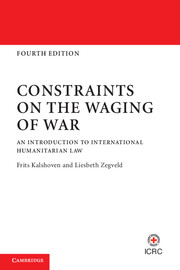6 - Conclusion
Published online by Cambridge University Press: 05 June 2012
Summary
The international humanitarian law of armed conflict, rather than being an end in itself, is a means to an end: the preservation of humanity in the face of the reality of war. That reality confronts us every day; the means remains therefore necessary.
The preceding chapters provide a sketch of the development of the international humanitarian law of warfare and of some of its problems. These problems are more varied and complicated than usually emerges in public debate, with its tendency to take notice of humanitarian law only in the context of given ‘topics of the day’: the potential use of nuclear weapons; the position of guerrilla fighters in wars of national liberation; the fate of the civilian population in contemporary armed conflict; or the wanton attacks on Red Cross or Red Crescent personnel. Important though each of these issues may be, we should not lose sight of the overall picture.
Information
- Type
- Chapter
- Information
- Constraints on the Waging of WarAn Introduction to International Humanitarian Law, pp. 280 - 281Publisher: Cambridge University PressPrint publication year: 2011
